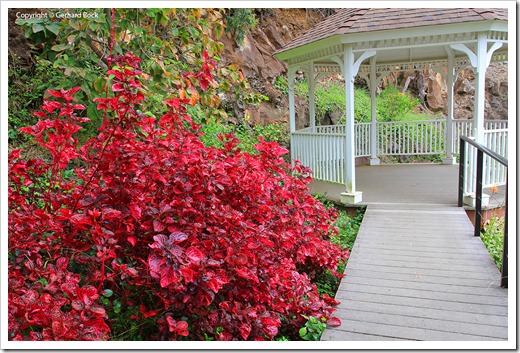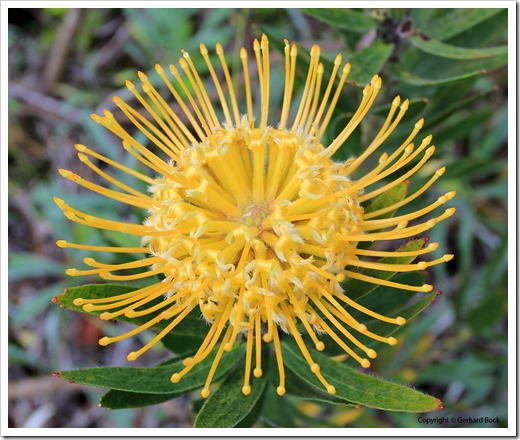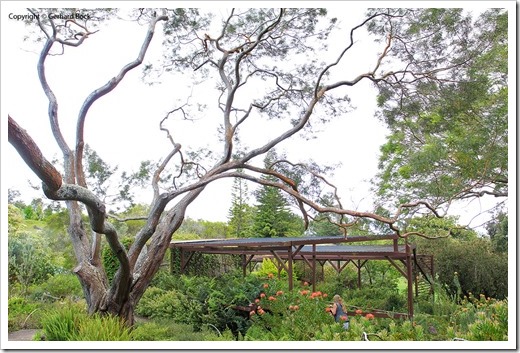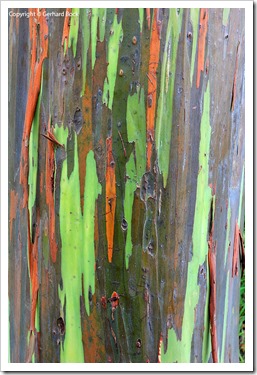Maui: Kula Botanical Garden, part 1
The Kula district is located on the west-facing slope of Haleakalā at an altitude of 500 to 2,500 ft. This area is part of what locals call “upcountry.” The climate here is cooler than on the coast, the soil is fertile, and there is more precipitation than in the arid southern and western parts of Maui.
Kula is the epicenter of the flower industry on Maui. Family farms growing proteas for the cut-flower market on the mainland dot the area (unfortunately, I couldn’t find one that is open to tourists). Kula is also home to two privately owned botanical gardens: Enchanting Floral Garden (closed the day I was in Kula) and Kula Botanical Garden.
Fox-tail agave (Agave attenuata)
Established in 1968, Kula Botanical Gardens has mature plantings of exotics from all over the world showcased on 8 hilly acres at an elevation of 1,000 ft. I visited on a Monday afternoon, and as was the case at Tropical Gardens of Maui, the parking lot was almost empty. While I was glad that I had the garden almost to myself, I hope this isn’t the way it always is. Places like this need a constant stream of paying visitors to survive.
LEFT: Norfolk Island pine (Araucaria heterophylla)
RIGHT: Candlenut tree (Aleurites moluccana) with staghorn fern (Platycerium sp.)
What would a garden in Hawaii be without tikis!
Kula Botanical Garden isn’t a scientific collection laid out according to rigid botanical principles so plants from all of the world happily live side by side in seemingly random fashion. This is how gardeners like you and me would plant our own garden, and it was just fine by me.
Bloodleaf (Iresine herbstii)
The photos in this post follow the same pattern. They appear in the order in which I took them as I explored the garden. Initially I was going to arrange them by plant group, or at least by region, but then I decided against it since the garden isn’t set up that way either. I hope you’ll enjoy the element of surprise and discovery.
Leucadendron hybrid ‘Safari Sunset
Banksia ericafolia—I would have loved to see this Australian native in bloom!
Banksia ericafolia
Predictably, Kula Botanical Garden has a strong focus on proteas. The ones from Australia (including the massive Banksia ericafolia above) weren’t blooming, but the leucospermums from South Africa were. As you can see below, their flowers are perfection.
Leucospermum cordifolium (yellow form)
Leucospermum cordifolium
Leucospermum cordifolium (red form)
Leucospermum cordifolium
Leucospermum cordifolium
Leucospermum cordifolium
Leucospermum cordifolium
Leucospermum cordifolium
Leucospermum cordifolium
Leucospermum cordifolium
Most king proteas (Protea cynaroides) were done blooming, but I found one that was already forming buds.
King protea (Protea cynaroides)
When you think of exotic flowers, hydrangeas don’t immediately spring to mind. However, take a look at specimen below. I have never seen such shockingly blue flowers on a bigleaf hydrangea before.
Bigleaf hydrangea (Hydrangea macrophylla)
Hydrangea macrophylla
As much as I love flowers, I’m even more attracted to the texture provided by leaves, tree bark, etc. There certainly was no lack of texture at Kula Botanical Garden. The next three photos are just a few teasers. You’ll send a lot more texture in part 2 of this post.
Monstera deliciosa
Rainbow eucalyptus (Eucalyptus deglupta)
Since I took so many photos at Kula Botanical Garden, I decided to split this post into two parts. Click here to go to part 2 (coming soon).
RELATED POSTS:

























I was about to say that the atmosphere and planting looks a lot more temperate than tropical but the altitude of its location explains it all. Another place on the wishlist to visit!
ReplyDeleteWow so pretty! I had never seen a Protea until I went to the San Francisco Flower & Garden show in 2012. They are so interesting and look alien. Your photos are super!
ReplyDelete